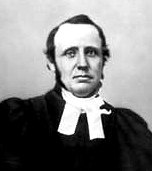Edward Cridge
1817 - 1913
 Clergyman, first superintendent of Vancouver Island's colonial school
system and namesake of the so-called Cridge Controversy which caused a
cassock-ripping rumble within the Church of England.
Clergyman, first superintendent of Vancouver Island's colonial school
system and namesake of the so-called Cridge Controversy which caused a
cassock-ripping rumble within the Church of England.
Born 17 December 1817 in Devon, England, the son of schoolmaster John Cridge, he received his B.A. at Cambridge in 1848 and was ordained a priest of the Church of England in 1849. In 1854, he was appointed to replace the Rev. Robert J. Staines as the chaplain-schoolmaster for the Hudson's Bay Company at Ft. Victoria, where he arrived on April 1, 1855.
The following year, the Council of Vancouver Island appointed him to a committee charged with "enquiring into and reporting upon the state of publick schools," of which there were three, one in Victoria, one in Craigflower and one in Nanaimo. In addition, the committee instructed him to "hold quarterly examinations and to report on the progress and conduct of the pupils, on the system of management and on all other matters connected with the District Schools which may appear deserving of attention." In effect, then, Cridge became the Island's first superintendent of schools.
Cridge's first annual report, submitted on 30 November 1856, dealt only with the Victoria and Craigflower schools. Cridge bemoaned "the want of accuracy and grounding in the elementary parts" at the Victoria school, where 17 boys aged six to 15 were enrolled. Subjects taught at the school were, in Cridge's words, "reading, writing, arithmetic, history, a little geography and grammar." The Craigflower school, which boasted 21 pupils -- 11 girls and ten boys -- received higher grades in Cridge's report. Although attendance was only fair at the school (a common problem at pioneer schools), the pupils were "fairly grounded in the elementary parts." Cridge concluded his report by emphasizing the colony's need for "a girl's school for the labouring class." Wrote Cridge: "It seems greatly to be lamented that those who are likely hereafter to perform so important a part in the community in the capacity of wives and mothers, should be suffered to grow up without education."
As an Anglican clergyman, Cridge was dean of Christ Church in Victoria until 1872 when he became engulfed in a theological row with Bishop George Hills. After several months of open bickering and the exchange of acrimonious notes between the two men, the conflict ended with Cridge's trial before an ecclesiastical tribunal, whose results were later upheld by the civil courts. Shaken perhaps but not stirred, Cridge seceded from the Church of England along with many loyal members of his congregation, including the Douglas family. The Cridge Controversy, as it became known, saw the disaffected pastor and his followers join the Reformed Episcopal Church. In 1875, on land donated by Douglas, the group built the Church of Our Lord where Cridge served as rector until 1908 when he retired after suddenly being struck blind.
Cridge married Mary Winmill, of Essex, England, in 1854; they had nine children. Cridge was the author of As it was in the beginning, published in 1890. Elected bishop of the Reformed Episcopal Church in 1875, his diocese included all of the United States and Canada west of the Rocky Mountains. He held this position until his death in Victoria at age 95 on 6 May 1913.
Researched & written by Russ Paradice, History 350, Malaspina University-College, November 1997.
Sources:
F. Henry Johnson, A History of Public Education in
British Columbia (Vancouver: University of British Columbia Publications
Centre, 1964).
D. L. MacLaurin, "Education Before the Gold Rush," British
Columbia Historical Quarterly, Vol. 2, No. 4 (October 1938).
Dorothy Blakey Smith (ed.), "Journal of Arthur Thomas
Bushby, 1858-1859," Biographical Appendix, British Columbia Historical
Quarterly, 21 (1957-58).
Donald H. Simpson, "Henry Press Wright: First Archdeacon
of Columbia," British Columbia Historical Quarterly, 24 (1955).
"Cridge, Edward," Encyclopedia Canadiana (1968).

